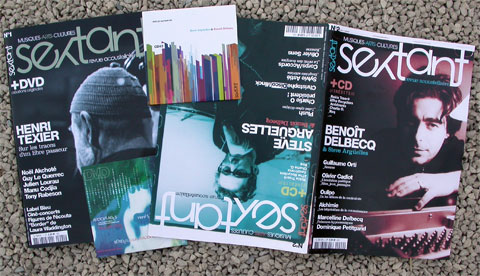Sextant: revue acoustellaire

(photo by Jean-Jacques Birgé)
I was initially hipped to Sextant, a new French magazine, by Samizdjazz (back in January!), then reminded of it by Jean-Jacques Birgé when the second issue came out. I then ordered both issues. It doesn't hurt that "acoustellar" is a great description of a great album by a great band that happens to almost bear my name.
In a nutshell, Sextant is a good example of what I think music magazines should be, post-Internet. The old news/interviews/reviews tied up in a neat publicity-driven bow is now totally redundant: you can not only read all that for free online, you can hear it, too. Sextant's website complements the magazine with more up-to-the-minute news and reviews, as well as audio/video. If you can get all your fast-food online, then paper has to be a lavish home-cooked meal, and that's what Sextant is. It's a bit like a hugely expanded version of The Wire's primers, made slowly and lovingly, totally unrelated to music industry business cycles and it takes a good while to read. The layout is spare and sleek, with a few details (eg. the pointers at the top of every page, the way articles interrupt the main interview) acknowledging the influence of the Internet on graphic design and information organisation.
Each issue is based around one or two musicians. #1 featured a long Henri Texier interview, broken up by interviews with collaborators such as Sébastien Texier, Noël Akchoté and photographer Guy Le Querrec and articles on artforms Texier is peripherally connected to. There's a DVD that I haven't watched yet. #2 does the same with Steve Argüelles and Benoît Delbecq. It comes with a CD that has a lot of exclusive or unreleased stuff. #3, coming in October, will feature Birgé and cellist Vincent Courtois. The interviewees are all progressive, challenging types and I hope that remains the magazine's approach.
I wouldn't call the writing extraordinary. Simply, it's at the level all magazines should be at, rather than the usual here's-my-latest-CD puff (Vibrations, the one music magazine I subscribe to, would do well to take some cues from Sextant). By dint of sheer length, the interviews can reach interesting places. Unfortunately, the articles, especially in the Texier issue, use the insufferably pretentious and obtuse academic prose France is rightly ridiculed for (but that language comes very naturally and sounds a bit less pretentious in french than in english). Is it really so bad to use "historical context" instead of "diachronic context?" However, that's just about my only complaint.
A final point, but an important one: there are no ads. Well, there was one (1) on the inside cover of the first issue. So when you buy it, you get pure content, 50 pages worth in #1, 62 in #2. That's non-negligeable and makes you feel like you're actually supporting something, rather than just pumping up circulation numbers to be shown to prospective advertisers.
|